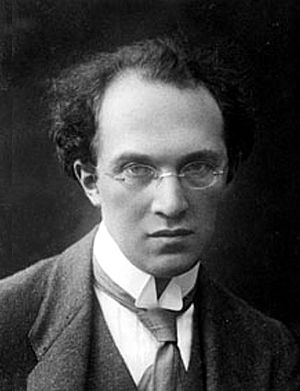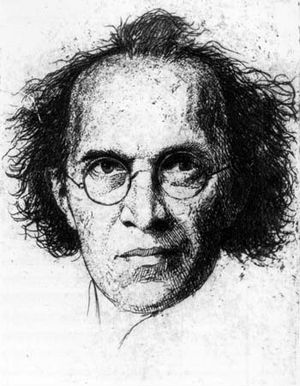Franz Schreker facts for kids
Franz Schreker (born Franz Schrecker; 23 March 1878 – 21 March 1934) was an Austrian composer, conductor, and teacher. He mostly wrote operas. Schreker's music mixed different styles like Romanticism, Expressionism, and Impressionism. He liked to experiment with new sounds and extended tonality, which means using musical keys in new ways. He was an important part of 20th-century music.
Contents
Early Life and Education
Franz Schreker was born in Monaco. His father was a photographer from Bohemia and his mother was from a noble Catholic family in Styria. Franz grew up traveling across Europe. After his father passed away, his family moved to Vienna in 1888.
In 1892, Schreker received a scholarship and started studying at the Vienna Conservatory. He first studied the violin but later switched to composition. He graduated as a composer in 1900. His first successful piece was the Intermezzo for strings, which won a prize in 1901. He finished his first opera, Flammen, in 1902, but it was never performed on stage at that time.
Starting His Career
Schreker began conducting in 1895. In 1907, he created the Vienna Philharmonic Chorus and led it until 1920. This chorus performed new works by famous composers like Zemlinsky and Schoenberg. Schreker and other composers were very important during the Jugendstil movement, which was an art style that used ideas from places like Ancient Egypt and the Far East.
His "pantomime" (a play without words), Der Geburtstag der Infantin, helped him become known as a composer. He wrote it for the dancers Grete and Elsa Wiesenthal in 1908. Because it was so popular, Schreker wrote more dance pieces for them, including Der Wind and Valse lente.
Success in Opera
In November 1909, a part of his opera Der ferne Klang (The Distant Sound) called Nachtstück (Night Piece) was performed. It was a big event. The full opera was first performed in Frankfurt in 1912, and this made him very famous. That same year, he started teaching at the Vienna Music Academy, where he had studied. By 1913, he became a full professor. Schreker wrote the stories (libretti) for all his main operas himself.
This period was a very successful time for Schreker. His next opera, Das Spielwerk und die Prinzessin, premiered in Frankfurt and Vienna in 1913. It wasn't as popular, but the stir it caused in Vienna made Schreker even more well-known.
Even though World War I started, Schreker's success continued. His opera Die Gezeichneten (The Branded Ones) premiered in Frankfurt in 1918, making him one of the top opera composers of his time. The performance of Der Schatzgräber (The Treasure Hunter) in Frankfurt in 1920 was the highlight of his career. His Chamber Symphony, written in 1916, is still one of his most performed works today.
In March 1920, Schreker became the director of the Hochschule für Musik in Berlin (Berlin University of Music). From 1920 to 1932, he taught many students who later became famous musicians, including Ernst Krenek and Artur Rodziński.
End of His Career
Schreker's fame was at its highest during the early years of the Weimar Republic in Germany. He was the most performed living opera composer after Richard Strauss. However, his success began to fade. His opera Irrelohe received mixed reviews in 1924, and Der singende Teufel (The Singing Devil) was not successful in 1928.
Political changes and the rise of antisemitism also played a role in the end of Schreker's career. Right-wing groups protested the premiere of Der Schmied von Gent (The Blacksmith of Ghent) in Berlin in 1932. Pressure from the National Socialists forced the cancellation of his opera Christophorus in 1933. In June 1932, Schreker lost his job as director in Berlin, and the next year, he also lost his teaching position.
During his lifetime, he went from being seen as the future of German opera to being forgotten as a composer and teacher. After having a stroke in December 1933, he passed away in Berlin on 21 March 1934, just two days before his 56th birthday.
Schreker was influenced by composers like Richard Strauss and Richard Wagner. His later music had its own unique sound, using many different notes and harmonies, even though it was still mostly tonal. He also got musical ideas from his friend Arnold Schoenberg, using an expressionist style.
The Third Reich banned Schreker's music because he was of Jewish origin, along with many other composers. His early death and the Nazi ban stopped his music from becoming well-known outside of German-speaking countries for a long time.
Schreker's Music Today
After many years of being forgotten, Schreker's music is now becoming popular again in Germany, Austria, and the United States. In 2005, the Salzburg Festival performed Die Gezeichneten. The Jewish Museum in Vienna also had an exhibition about his life and work.
New performances of Der ferne Klang were staged in Berlin and Zurich in 2010. Irrelohe was performed in Vienna in 2004 and in Bonn in 2010. In 2022, Irrelohe was performed for the first time in France. Also in 2022, Schreker's operas were performed in the USA for the first time: Die Gezeichneten in Los Angeles and Der ferne Klang at the Bard Summerscape Festival.
Selected Works
Operas
- Flammen, Op. 10 (1901/02)
- Der ferne Klang (1903–1910)
- Das Spielwerk und die Prinzessin (1908; 1909–1912); revised as Das Spielwerk (1915)
- Die Gezeichneten (1911; 1913–1915)
- Der Schatzgräber (1915–1918)
- Irrelohe (1919–1922)
- Der singende Teufel (1924; 1927–1928)
- Christophorus (oder Die Vision einer Oper) (1925–1929)
- Der Schmied von Gent (1929–1932)
Orchestral Works
- 1900: Intermezzo for string orchestra, Op. 8
- 1902–1903: Ekkehard: Symphonic Overture, Op. 12
- 1903: Romantische Suite, Op. 14
- 1904: Phantastische Ouvertüre, Op. 15
- 1906–1907: Nachtstück (from the opera Der ferne Klang)
- 1908–1910: Der Geburtstag der Infantin: Dance-pantomime
- 1916: Chamber Symphony
- 1922: Symphonic Interlude (from the opera Der Schatzgräber)
- 1923: Der Geburtstag der Infantin: Suite for large orchestra
Choral Music
- 1900: Psalm 116 for women's chorus, orchestra and organ, Op. 6
- 1902: Schwanengesang for mixed choir and orchestra, Op. 11
Chamber Music
- 1898: Sonata for violin and piano
- 1909: Der Wind for clarinet, horn, violin, 'cello and piano
His main music publisher was Universal Edition.
See also
 In Spanish: Franz Schreker para niños
In Spanish: Franz Schreker para niños
 | Misty Copeland |
 | Raven Wilkinson |
 | Debra Austin |
 | Aesha Ash |



